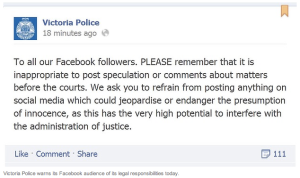It is hard to argue against the fact that social media has given power back to the people.
Social Media was used with great artistry in 2008 when the Democrats appealed to a younger generation of Americans to vote Obama, the campaigns were so effective that they won advertising’s most respected prize, the Cannes Lion. Also recently, it was Social Media that sparked a revolt against oppressive regimes in North Africa and the Middle East, and became the tools for freedom in Egypt. As Social Media becomes more and more widespread, the voice of the people, becomes increasingly influential as it infiltrates all facets of society, from journalism to even our justice system.
Nowhere is this more apparent than the case of Jill Meagher. A tragic story of a young journalist that was missing for days and eventually found dead. The story became a Social Media phenomenon, at first Social Media was helping search for Meagher, but when she was found dead, murdered, the concern that was being expressed, turned to grief and now anger. “A Facebook hate group against the accused in the Meagher case has already attracted almost 18,000 “likes”. ”
The concern that is expressed by Police and legal experts is that Social Media is influencing the case even before the facts are presented.
It prompted the Victorian Police to publish their own warning on Facebook… Social Media is the democratization of journalism, anyone can be published no matter what their qualifications on any particular topic. It becomes dangerous when a group, like in Meagher’s case, starts to react to emotion and forget about an individuals right to a fair trial.
Social Media is the democratization of journalism, anyone can be published no matter what their qualifications on any particular topic. It becomes dangerous when a group, like in Meagher’s case, starts to react to emotion and forget about an individuals right to a fair trial.
So how do we curb the mob mentality in Social Media, can we punish those who behave irresponsibly, those who incite hate; set laws and parameters, that ultimately curb free speech. If we start policing Social Media, we loose what the medium has given us, the chance to voice our opinion without the fear of reprisal, the ability to cry ‘foul’ against behemoths like governments and corporations.
In my opinion there is no quick fix to the problem, the best course of action is to educate on what is responsible behaviour in Social Media. The appropriate behaviour will only come about when individuals start to realise that what they publish can cause harm to others.
